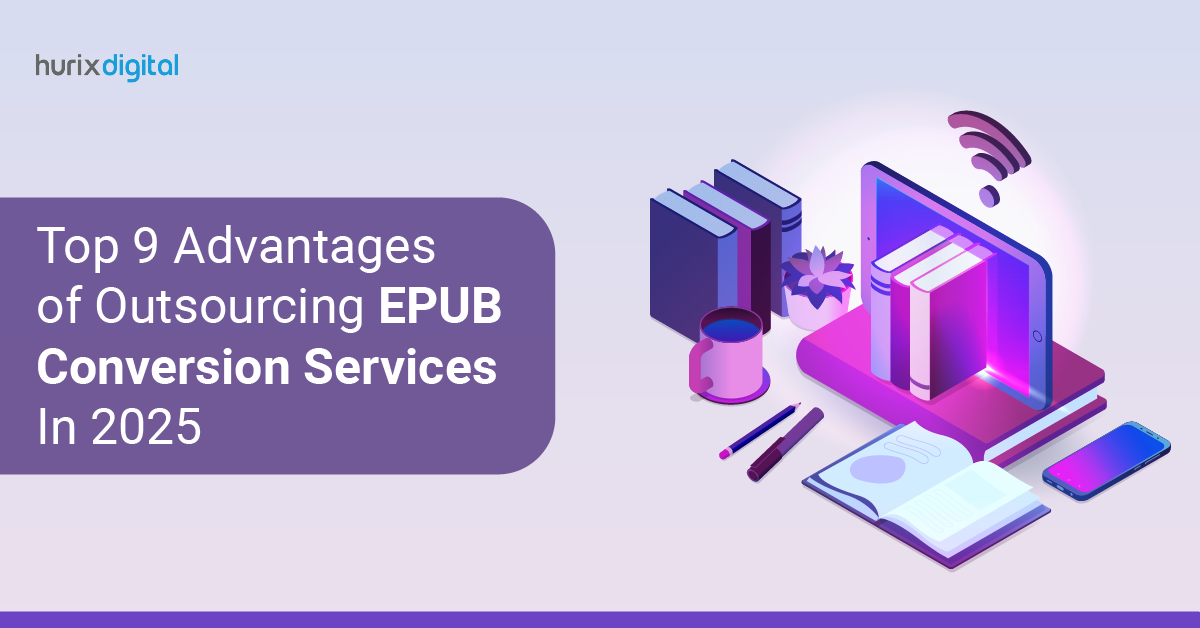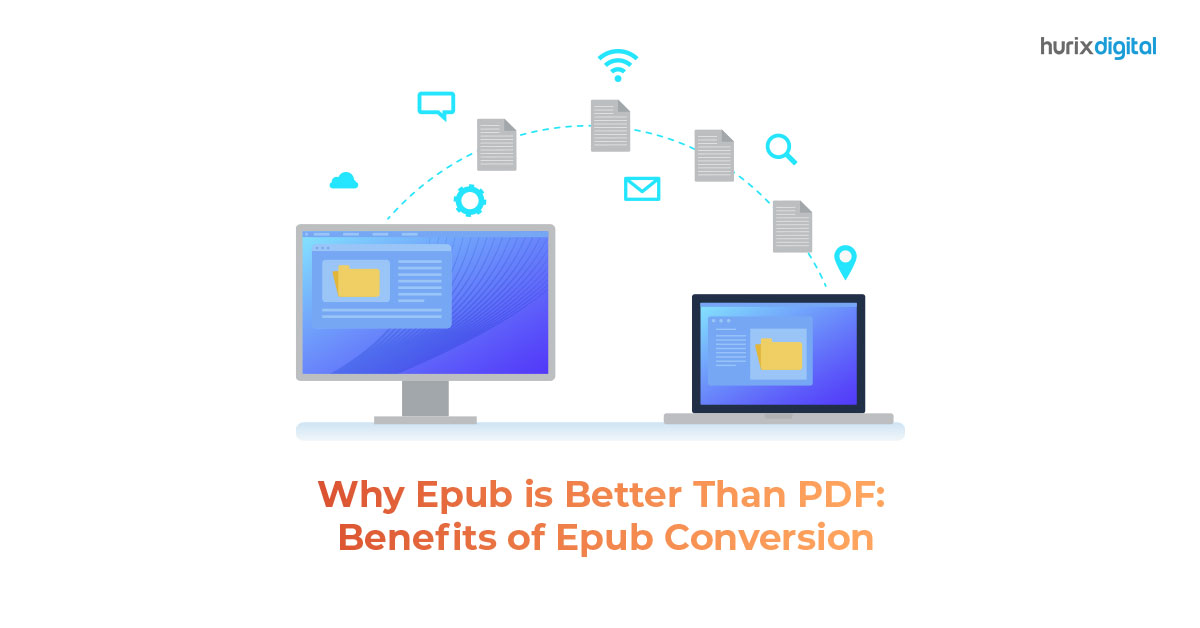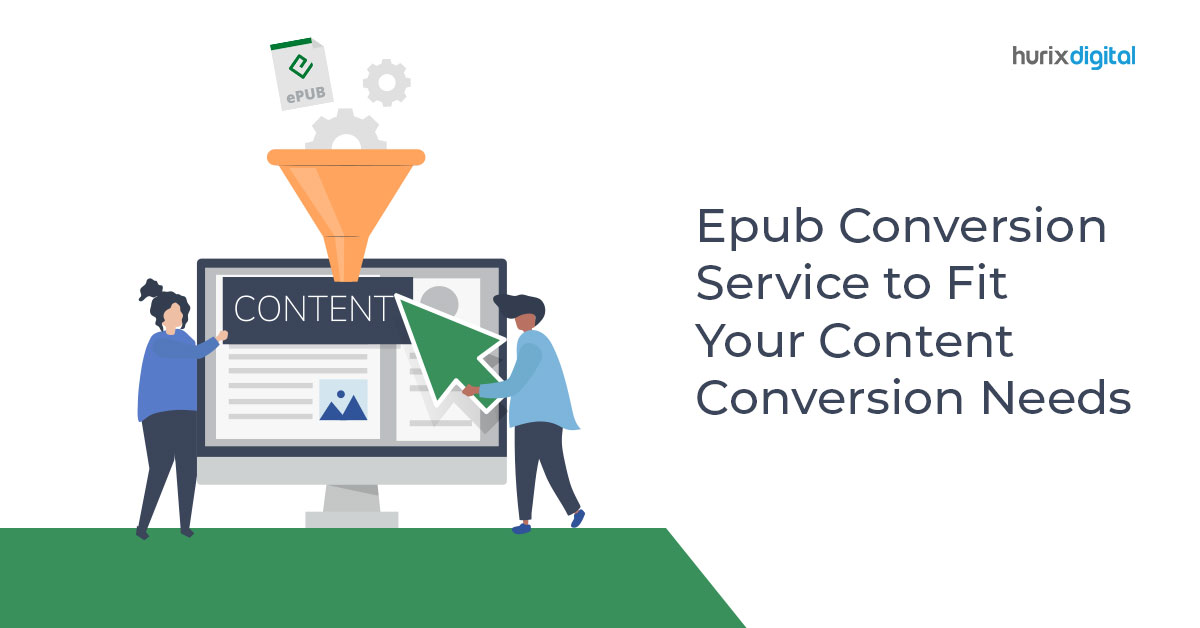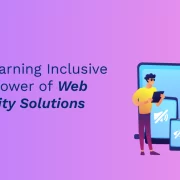
Top 9 Advantages of Outsourcing ePUB Conversion Services in 2025
Summary
This article examines ePUB format evolution, emphasizing the benefits of outsourcing ePUB conversion services for publishers, and discusses features, advantages, and criteria for choosing the best provider.
ePUB is now a standard electronic publication format that is compatible across devices. The final stage of its development is ePUB3 conversion, which offers more interaction, accessibility, and integration with multimedia files.
The publishing industry is revolutionizing, and digital formats are becoming the preferred format of learners and readers worldwide. The global eBook market is expected to grow by $12.40 billion from 2023 to 2028, growing at a CAGR of 10.08%. EBook readers are expected to grow to 1.1 billion by 2027.
This shows the increasing demand for high-quality eBooks, which makes ePUB conversion services indispensable for publishers.
Outsourcing ePUB conversion services empowers publishers to manage extensive backlists, improve multimedia and integration, and launch new titles to convert content economically and with high quality.
Let us explore the leading benefits of outsourcing ePUB conversion services and the differences between ePub and ePub3!
Table of Contents:
- About ePUB Evolution
- Key Features of ePUB Conversion Services for Publishers
- Advantages of Outsourcing ePUB Conversion Services for Publishers
- How to Choose the Best ePUB Conversion Services for Publishers
- Conclusion
About ePUB Evolution
The International Digital Publishing Forum (IDPF), which merged with the W3C, developed and maintained the EPUB format. Here are the different phases of ePUB evolution
- EPUB 1.0 (2007) was introduced as a successor to the Open eBook format.
- This was followed by ePUB 2.0 (2007-2011), the most popular version adopted to better support reflowable text.
- In 2011, ePUB 3.0 was launched to support the modern web technologies.
- In 2017, ePUB 3.1 was established, with minor refinements from 3.0 and enhancements to accessibility features under WCAG standards.
- ePUB 3.2 in 2019 is the latest version of the book, which has improved backward compatibility.
EPUB vs EPUB3
EPUB3 advances EPUB2 with much-upgraded features and modern web-based standards. Here is a comparison:
| Feature | EPUB 2 | EPUB 3 |
| Language | XHTML 1.1 | HTML5 (with XHTML support) |
| Styling | Basic CSS | Advanced CSS3 |
| Multimedia | Limited | Supports audio, video, and animations |
| JavaScript Support | No | Yes, along with interactivity and dynamic behavior |
| Accessibility | Basic | WCAG-compliant with advanced accessibility |
| Fixed Layout | Limited with reflowable only | Supports fixed and reflowable layouts |
| Interactivity | Limited | High interactivity |
| Navigation | A basic table of contents | Advanced navigation landmarks and semantics |
| SVG Support | Limited | Fully supported |
| Fonts | Limited | Supports varied and advanced web fonts |
| Backward Compatibility | Works well with legacy devices | Compatible but requires ePUB3 readers |
Key Features of ePUB Conversion Services for Publishers
ePUB conversion services convert various document formats, such as PDF files, Word documents, InDesign files, or paper-based material, into digital formats according to the ePUB format requirements. The services can meet unique publisher requirements and deliver eBooks that can be compatible with several Readers and devices.
Some of the key features of ePUB conversion services include:
- Convert PDF, HTML, InDesign, etc., to ePUB format.
- Optimization of content into reflowable content, fixed-layout, and multimedia components.
- Incorporation of multimedia features such as audio, video, quizzes, gamified elements, animations, and interactive elements.
- Strict conformance to WCAG 2.0 and ADA standards for accessible reading experience.
- Verification and testing for error-free output that is also device-friendly.
- Enhance the metadata for better discoverability and search engine optimization.
Also Read: Ultimate Guide to eBook Conversion Tools Compatible with Multiple Formats
Advantages of Outsourcing ePUB Conversion Services for Publishers
With ePUB conversion services, publishers can streamline production workflows and deliver enriched digital content to readers and learners worldwide. Here are the key benefits of ePUB optimization:
1. Cost-Effectiveness
Conversion of ePUBs into other formats through outsourcing reduces the cost of operation since:
- Specialized ePUB conversion tools are very costly to license for publishers. Professional ePub3 conversion services use their resources.
- Training in-house personnel on complex ePUB standards, such as ePUB3 conversion for interactive eBooks, is time-consuming and costly. Outsourcing means the publisher only pays for the work rather than hiring dedicated ePUB professionals.
2. Focus on Competencies
Outsourcing empowers the publisher to focus on high-level priorities, such as:
- Creation of superior, top-quality, and attractive content for readers.
- Promoting eBooks to audiences using advanced strategies through digital marketing, social media, and other advertisements.
- Reaching markets worldwide on various platforms.
3. Speed of Delivery
Outsourcing companies have a skilled workforce that can work on tight schedules without compromising quality. Their optimized workflows ensure publishers that:
- Their scripts are converted into ePUB formats faster.
- Large back catalogs can be digitized in weeks instead of months.
4. Latest Technology
Outsourcing agencies use the latest technology software, tools, and platforms and offer the following benefits:
- Support rich multimedia, interactivity, and responsive designs.
- Process automated quality checking, indexing, and error detection for accurate formatting.
- Ensure eBook optimization and compatibility across multiple formats – ePUB, MOBI, and PDF ensures enhanced reading experiences on varied devices.
5. Scalability and Flexibility
Outsourcing is scalable and flexible and helps publishers in adjusting the production volume depending on demand.
For instance, a publisher launching a new series globally can scale up operations without needing temporary staff by outsourcing ePUB conversion services to a professional. This saves him time and overhead costs.
6. Higher Quality and Reliability
Seasoned ePUB outsourcing partners produce error-free eBooks with advanced software for:
- Removing layout problems, incorrect fonts, and image placement.
- Ensuring ePUB files pass industry-standard checks, like IDPF guidelines.
7. Increased Accessibility
Accessibility features are integrated to ensure the provision of products according to international standards, including WCAG 2.1 and Section 508. Such features include:
- Screen reader compatibility
- Alt text for images
- Structured navigation
8. Specialized Skills and Expertise
Outsourced ePUB conversion services provide:
- Complex content such as scientific journals, mathematical formulas, or interactive children’s books.
- Content in multiple languages, ensuring international accessibility.
9. DRM Capabilities
Security of eBooks is utmost. Professional outsourcing providers for ePUB conversion services can protect content from piracy, cyber theft, and unauthorized usage. Here are some benefits:
- They follow strict data security protocols and protect content during conversion and delivery.
- They use encryption, watermarking, and others to protect the content and build monetization capabilities for publishers.
How to Choose the Best ePUB Conversion Services for Publishers
Selecting the right ePub conversion services is critical to provide quality, efficiency, and dependability. There are a set of criteria on which this depends:
1. Expertise and Experience
Choose ones who are proven in eBook conversion and have experience in delivering ePub3 conversion. Ask about their exposure to complex file formats and mega projects.
2. Technological Capabilities
Ensure the provider uses the latest tools and technologies for ePUB optimization. Check if they can integrate multimedia, DRM capability, cloud-based services, accessibility compliance, and validation testing.
3. Portfolio and Client Testimonials
Review previous projects, case studies, and client feedback to assess the reliability and quality of the service.
4. Accessibility Compliance
Select a provider who complies with accessibility standards all over the world such as WCAG 2.0, providing the benefit of accessible reading.
5. Customization and Flexibility
Choose suppliers who provide personalized services according to your needs. It may be a reflowable format, fixed layout, or interactive ePUB3 features.
6. Delivery Time and Support
Consider their speed in delivering orders and their level of support after the initial order in case of revisions or technical issues.
7. Price Transparency
The price quotes should be clear and have no hidden costs. Compare quotations and evaluate value for money.
Considering all these factors, a publisher can join hands with the best ePUB conversion services provider to facilitate smooth workflows and deliver advanced and secure eBooks to the audience.
Also Read: What to Do for Converting PDF to ePub3?
Conclusion
ePUB evolution and significance of ePUB vs. ePUB3 conversion has transformed the publishing industry. It now brings interactive and accessible content to learners and readers. Outsourcing ePUB conversion services allows publishers to focus on their operations and costs and ensure quality output.
Through Hurix Digital, you can ensure the highest-grade ePUB conversion solutions customized to your needs. With expertise in advanced technologies, accessibility compliance, and multimedia integration, Hurix Digital provides publishers with enriched digital delivery.
Talk to the experts to find out how eBook conversion services can help in growing your publishing business.

Vice President – Digital Content Transformation. He is PMP, CSM, and CPACC certified and has 20+ years of experience in Project Management, Delivery Management, and managing the Offshore Development Centre (ODC).







